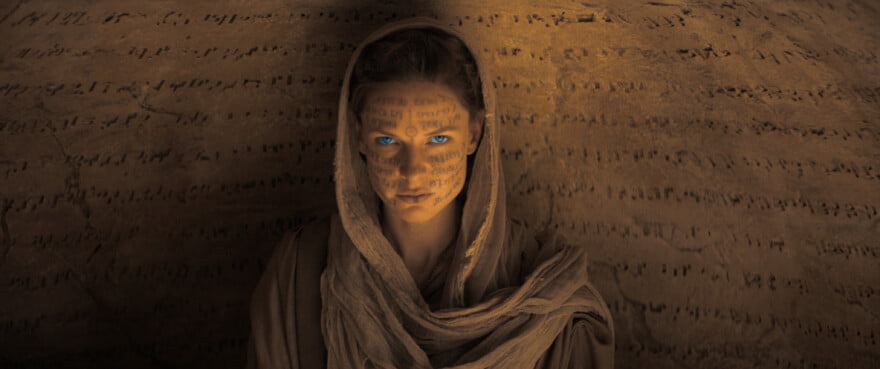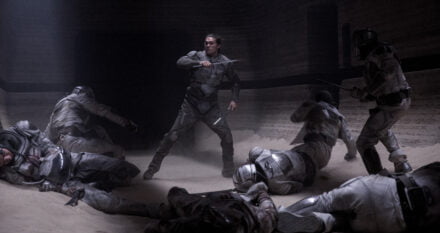Denis Villeneuve is one of Canada’s best directors, and to date the Québécois filmmaker has taken on some bold, often massive stories, from Blade Runner 2049, and Arrival, to Sicario, Enemy, and now Dune.
Dune is his most remarkable work so far, and it’s a film that seemed almost impossible to capture in a way that would do the book justice, but Villeneuve has done just that.
The scale of the film is otherworldly, and from the characters to the subtle changes Villeneuve and his team have made to the story, the film is an incredible realization of Frank Herbert’s classic science fiction novel.
During the Toronto International Film Festival this year, I sat down with Villeneuve to talk about the film, his vision and influences, and what the film represents for him.
Dune opens in theatres on October 22. Plus, read my interview with star Rebecca Ferguson.

For Villeneuve, working on Dune meant working with some important themes and ideas that have become even more relevant today.
The director was drawn to the story because “good science fiction means that it will necessarily be a criticism of reality or at the least a mirror of reality. So… there are several topics that are being explored by the novel that I feel became more relevant as time passed by.”
“I think the novel is more relevant to today’s world than it was when it was written in the beginning of the sixties. As an example, that the impact of colonialism is still totally relevant to today’s world. The over-exploitation of natural resources, the danger of blending politics and religion together; it’s all subjects that are very relevant to today’s world.”
“The environmental crisis, it’s something that Frank Herbert foresaw in the sixties that he was concerned by, [and he] was worried by the change in climate, right?”
Talking about his influences, Villeneuve remembered one of the things that affected him the most.
“When I was a kid I had an aunt that came back home one evening and said, ‘a friend of mine was about to throw out those three boxes.’ They were about to put it in the trash, but I kept them with me and I looked inside those boxes… and the boxes were filled with European graphic novels called… Pilote.”
“It was filled with insane imagination coming from great artists, like… Mœbius [Jean Giraud].”
“I was maybe eight or nine years old and it was a total aesthetic shot for me to go through those graphic novels and discover the visions of those artists that still today are fueling me and they are at the very core of my sci-fi education. And I think they are the ones who influenced [me] most of everybody in today’s world and in cinema. These guys were the visual pioneers of modern sci-fi and I owe them everything.”
“And, you know what, when I was in Paris I had the chance to finally meet two of those masters… and I was moved to tears to meet Jean-Pierre Gibrat and Philippe Druillet. They were two of my childhood heroes. You know, these guys are masters.”
Looking at Dune and the challenges of bringing the book to the screen, Villeneuve wanted to make sure the film wasn’t just for fans of the novels.
“I would say that one of the biggest challenges was to make sure that someone that knows nothing about the book will feel welcome, and [would] not get lost into this universe, and they will totally understand the movie.”
“The story [from] the book is kind of simple, but the world that Frank Herbert brought to life is very complex and rich, and so, to make sure that I will please the hardcore fans that loved the book so much, [and to] make sure that I will respect and honour the beauty and the poetry and the power of the book. And at the same time, make sure that the people who know nothing about it will feel welcomed.”
“That was one of the most difficult things to do for this adaptation. I would say that the fact that we split the movie in two parts makes it easier, because it means that I kept elements for the second movie, but I had to make strong choices. One of them was to make sure that my adaptation would focus on the relationship between Paul Atreides and his mother, and that would be at the very heart of the movie. That [made] other characters maybe less present, [but] that’s why I could not bring everything in there. The movie would have been crushed under the pressure of so much information.”
During a recent interview, Dune star Jason Momoa said how much he hoped there will be a four to six hour cut of the film, so I asked Villeneuve if that was likely to happen.
“What you saw is the director’s cut. Jason, I love his enthusiasm. He’s a close friend of mine, and the thing is that Jason saw the movie maybe four or five times. Every time [he] watched it, he called me because he would say, oh, how proud he is, and how happy, and that [went] straight to my heart because, you know, when you bring actors into movies, you are like the captain of the boat and you say to them, ‘we’re going to discover America,’ and you hope that the boat won’t sink.”
“And then, when the actors are happy about the movie, there’s nothing more reassuring for me. And I love his enthusiasm, but the cut he’s talking about doesn’t exist. I could have made a longer movie… it’s just that the movie I was dreaming to do was the length that I was aiming for, and that’s the movie I brought to the world.”
When Villeneuve talked about the spirit of the film, and even his style of filmmaking, he summed it up as “hope.”
“The idea that, in all the brutality of the world, there’s something about our spiritually, [and] ultimately our sacred relationship with nature. That mystery brings hope because there’s something that we are slowly discovering, unfolding with science through the decades and the centuries.”
“We’re trying to get closer to some truth, and the more we think [we’re] getting closer to the truth, the more it brings you humility… [and] at the very centre, could be a door to a profound solace, and finally bring peace.”
“It’s like the key of all this is bringing back humanity with our relationship with nature.”
Finally, the director talked a little about working with his team to come up with the visual style of Dune, and how he wanted to start with a fresh perspective.
“I asked my team to do something kind of impossible… to try at first, at least, to dream about the movie, to try to go back to the roots of what they saw when they read the book.”
His goal was for them to reach a “subconscious… dream state,” rather than doing research “or being influenced by other artists.”
“Saying this, it’s a bit impossible because we are the product of a multiple influences, and we are filled with images coming from outside, but I tried at least for the very beginning to say to my close partners, ‘let’s dream together. Let’s not try to find references. Let’s not try to work. Let’s just try to, as much as possible, to go deep inside ourselves.’ That’s what I did right at the beginning in order to try to find something that will feel kind of new to the ideas.”

All images courtesy of Warner Bros. Entertainment Inc.
Join our list
Subscribe to our mailing list and get weekly updates on our latest contests, interviews, and reviews.


